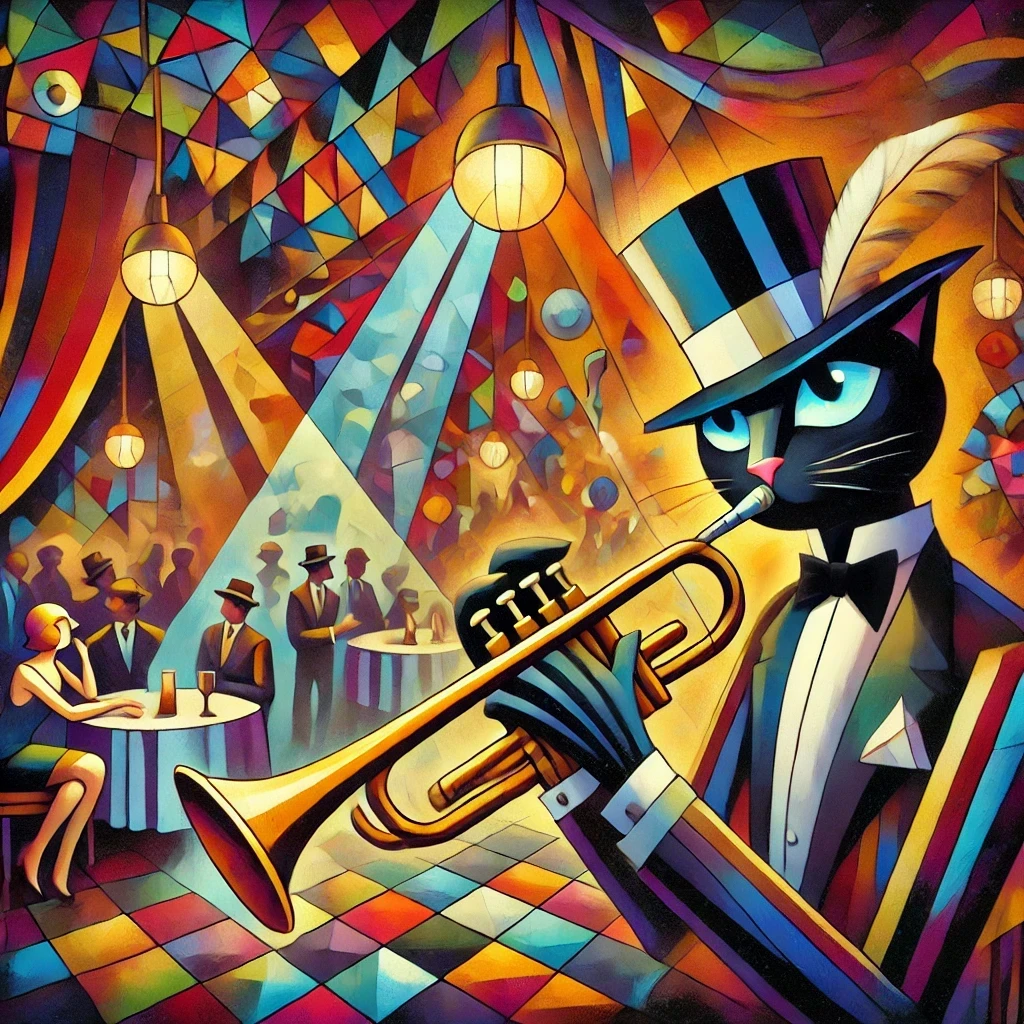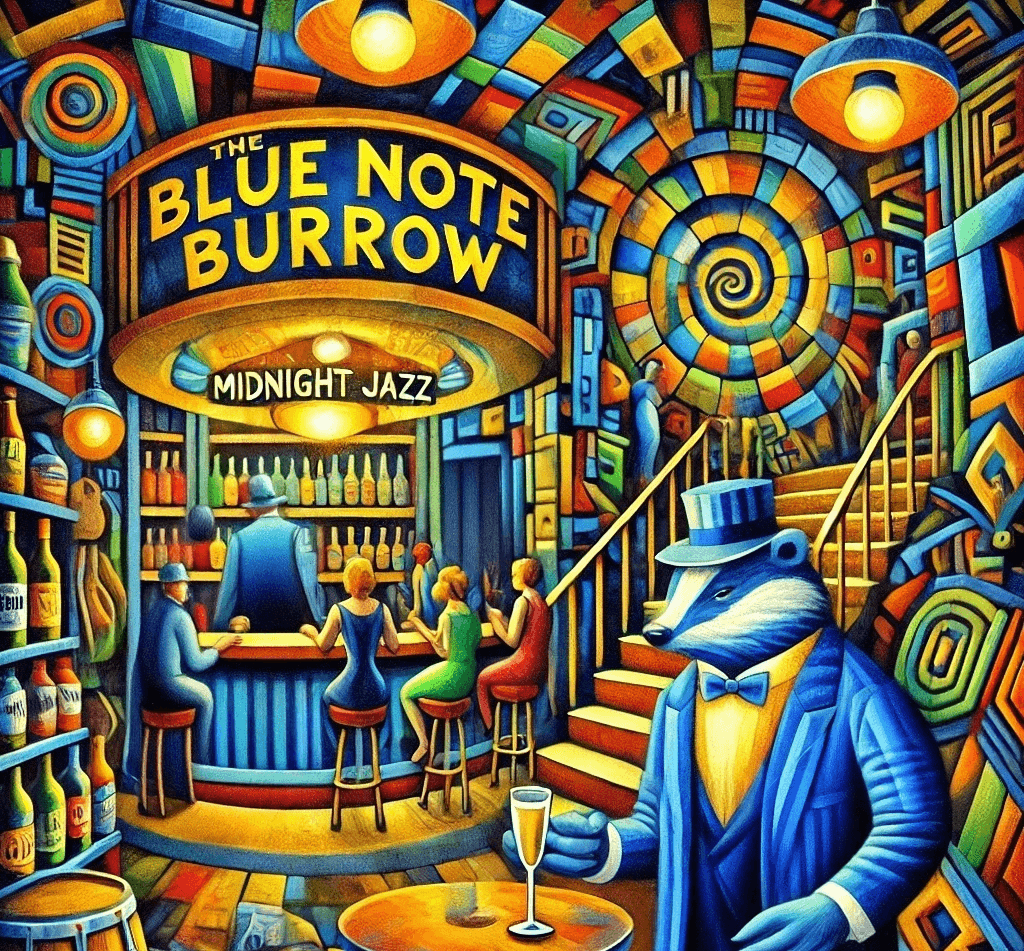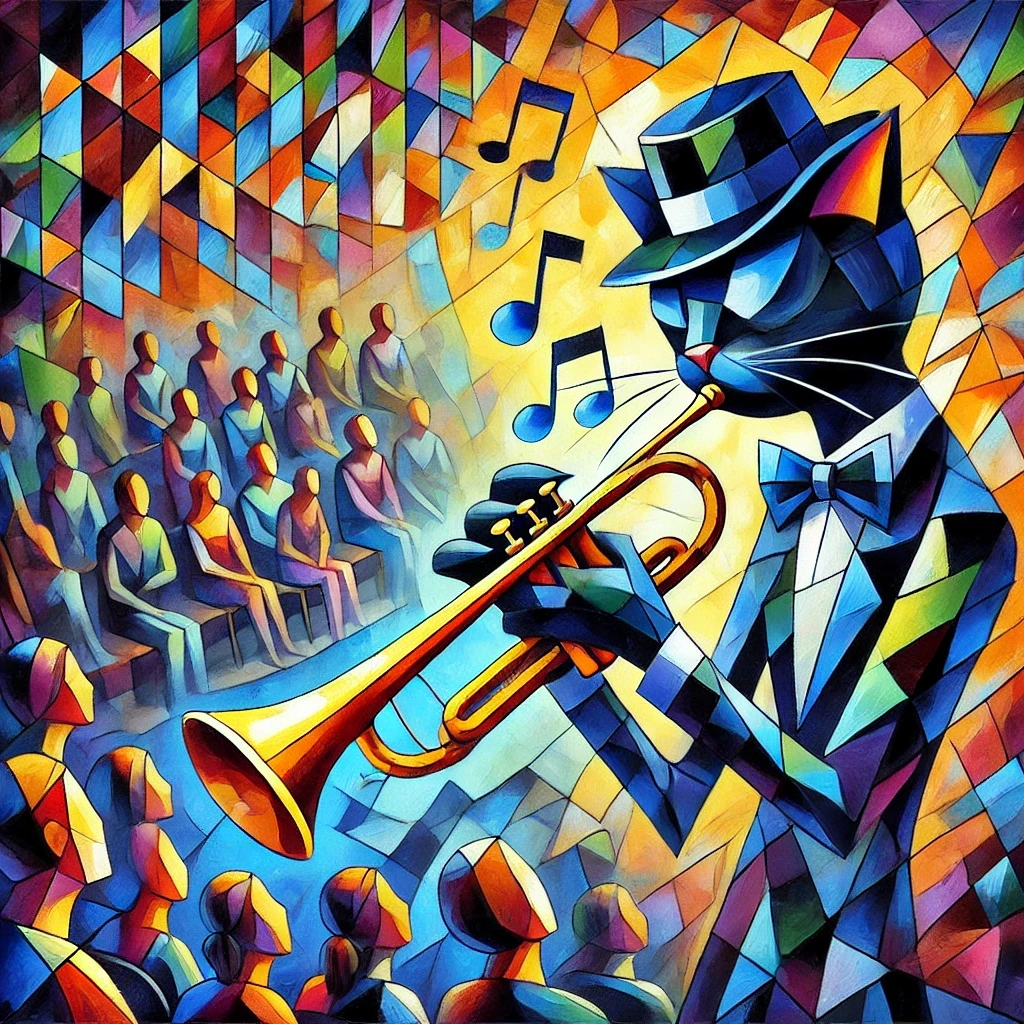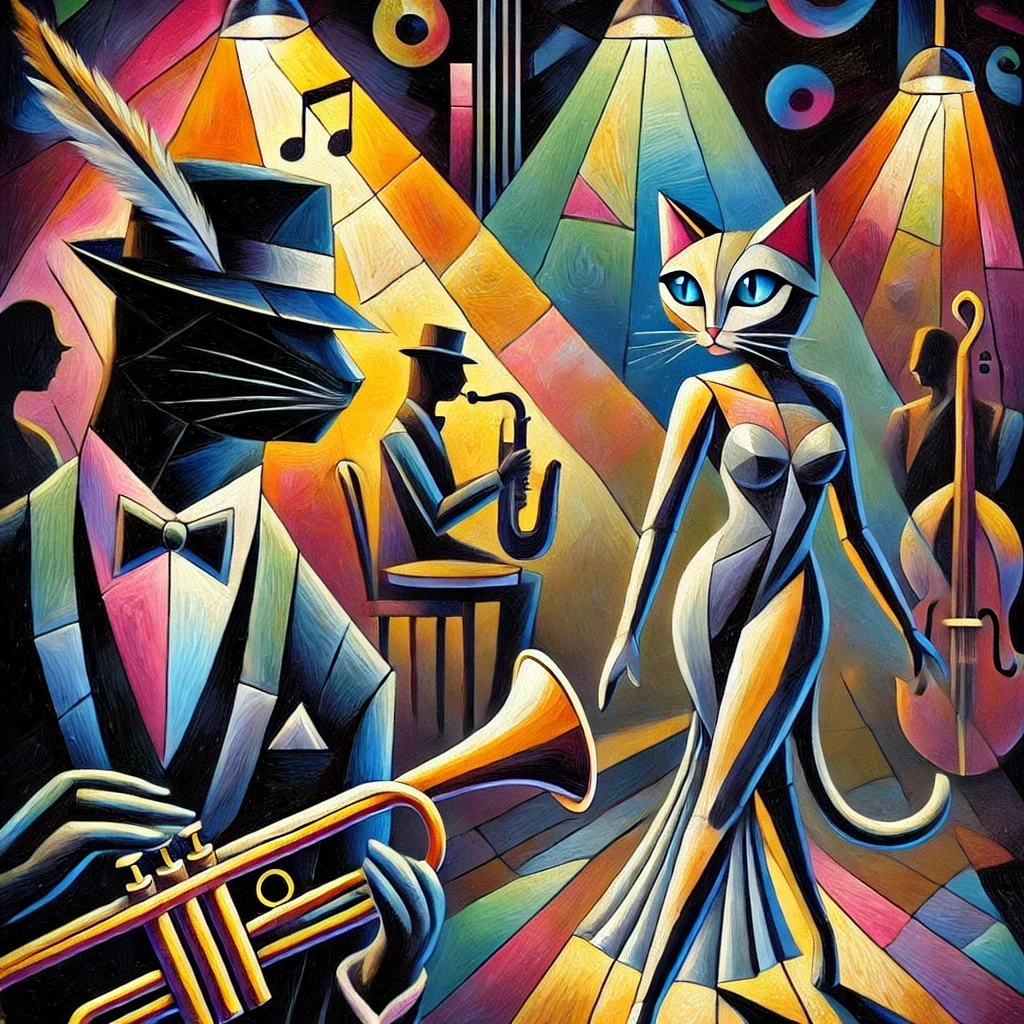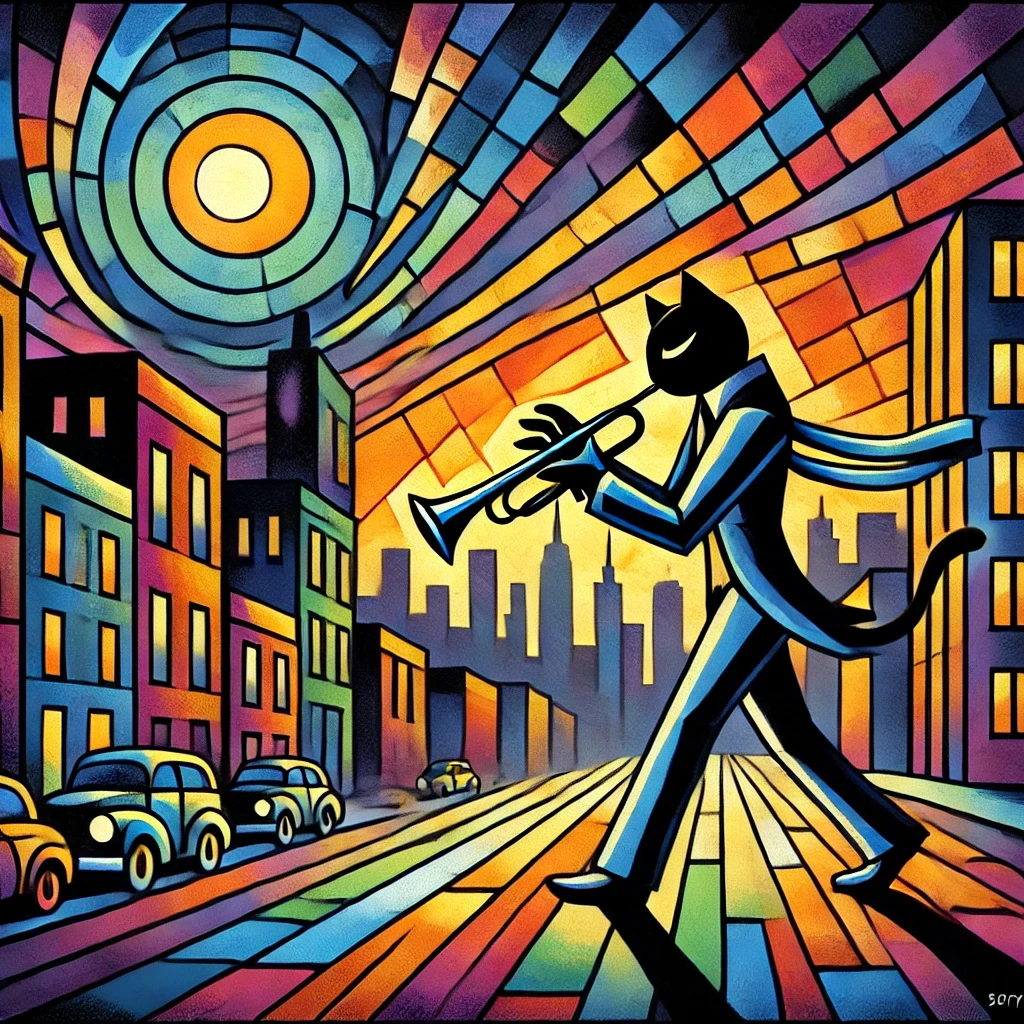In the glittering heart of 1920s New York City, where jazz notes danced in the smoky air, lived a cool cat named Miles Whiskerton. Miles wasn't a typical feline; his talents set him apart in the bustling, rhythm-driven streets of Harlem. With fur as dark as the night and eyes that sparkled with a thousand stories, Miles enchanted every club's crowd with his extraordinary skill on the trumpet.
Miles played at the hottest spots in town, but his all-time favorite was The Blue Note Burrow, an underground speakeasy hidden beneath a nondescript bodega. The entrance was concealed behind a rotating shelf of canned goods. Only those who knew to ask for “Midnight Jazz” were granted entry by the ever-watchful owner, Mr. Leonardo, a rotund and jovial badger who adored music as much as he loved secrecy.
One particularly balmy Saturday night, The Blue Note Burrow buzzed with anticipation. Champagne glasses clinked, beads and sequins shimmered, and jazz enthusiasts filled every nook and cranny of the dim, intimate space. Tonight, the marquee promised an unparalleled performance by Miles Whiskerton and his ensemble, The Harlem Hounds.
Miles strutted onto the minuscule stage with an air of confident poise, adjusting his white bow tie and tilting his plumed fedora. His bandmates — Duke on the piano, Scratch on the upright bass, and Riff on the drums — awaited his signal. With a deep breath, Miles lifted his gleaming trumpet, its golden finish reflecting the overhead lights.
The first note Miles played was soft but powerful, like a whisper that demanded attention. He launched into a heart-wrenching rendition of "Solitude Serenade," the bluesy tones wrapping around the audience, pulling them into a shared, soulful experience. Every note from his trumpet was a poignant story, a cry, a laugh—a reflection of life's deepest emotions.
As the haunting melody filled the room, there was no denying Miles' unparalleled skill. His trumpet seemed to sing, to laugh, to love, and to mourn. The instrument was an extension of his very soul. The audience was spellbound, each individual lost in their own reverie, drawn by the passion and fire behind every breath Miles blew into his horn.
But tonight, Miles had something special planned. He stepped to the front of the stage, his gaze sweeping the room before settling on a shadowy corner. “Ladies and gents,” Miles purred into the mic, “I’d like to introduce a dear old friend, back from parts unknown. Put your paws together for Miss Billie Mirage.”
Out of the shadows stepped a sleek Siamese cat, her sapphire eyes glinting under the muted lights. Billie, once a celebrated singer, had vanished from the scene years ago for reasons whispered but never confirmed. Her presence electrified the room. Dressed in a flowing silver gown, she moved with a grace that matched the fluidity of Miles' music.
Billie Mirage took her place beside Miles, and as Duke struck up the opening chords, she began to sing. Her voice, sultry and full of longing, melded seamlessly with the lyrical tones of Miles' trumpet. Together, they performed an original piece called "Harlem Highlights," a song that captured the spirit of the age — the excitement, the despair, the dreams, and the heartbeats of Harlem itself.
The duet was more than music; it was a conversation between old friends, tangled with memories and unspoken words. Miles' trumpet sang of wild nights and quiet mornings, of jazz and moonlight, while Billie’s voice wove through the notes like a silken thread, adding depth and color to the tapestry they created.
As the piece drew to a close, Miles lifted his trumpet and launched into an impromptu solo, the likes of which no one had ever heard. His fingers danced over the valves, and the trumpet unleashed a torrent of brilliant notes. The sound was a cascade of emotion, weaving in and out of Billie’s vocal lines, lifting the audience higher and higher until they felt they might soar from their seats.
It was in this crescendo of passion that Miles' true gift shone brightest: his ability to make the trumpet speak, to convey every nuance of feeling with a purity that resonated to the core. The trumpeter’s genius lay not just in his technical prowess, but in his capacity to make every listener feel as though the music was speaking directly to them.
As the final note hung in the air, the roar of applause was deafening. Billie nodded her gratitude and retreated into the shadows, her enigmatic smile lingering as a promise of her return. But the night was far from over.
Miles looked towards his bandmates and, with a playful glint in his eye, launched into a jubilant number, "Jazz Alley Joyride." The upbeat tempo was a stark contrast to the deeply emotional pieces before, yet it perfectly encapsulated the duality of jazz — its capacity to celebrate life with unbridled joy and to explore its deepest, darkest corners.
Later that night, after the audience had long since left The Burrow and gone to sleep, Miles strolled out into the velvet evening air, the sounds of the city settling into its nocturnal rhythm. He took a deep breath, lifted his trumpet, and blew a tender, solitary note, a whisper for the awakening dawn.
© Odd Voyage
